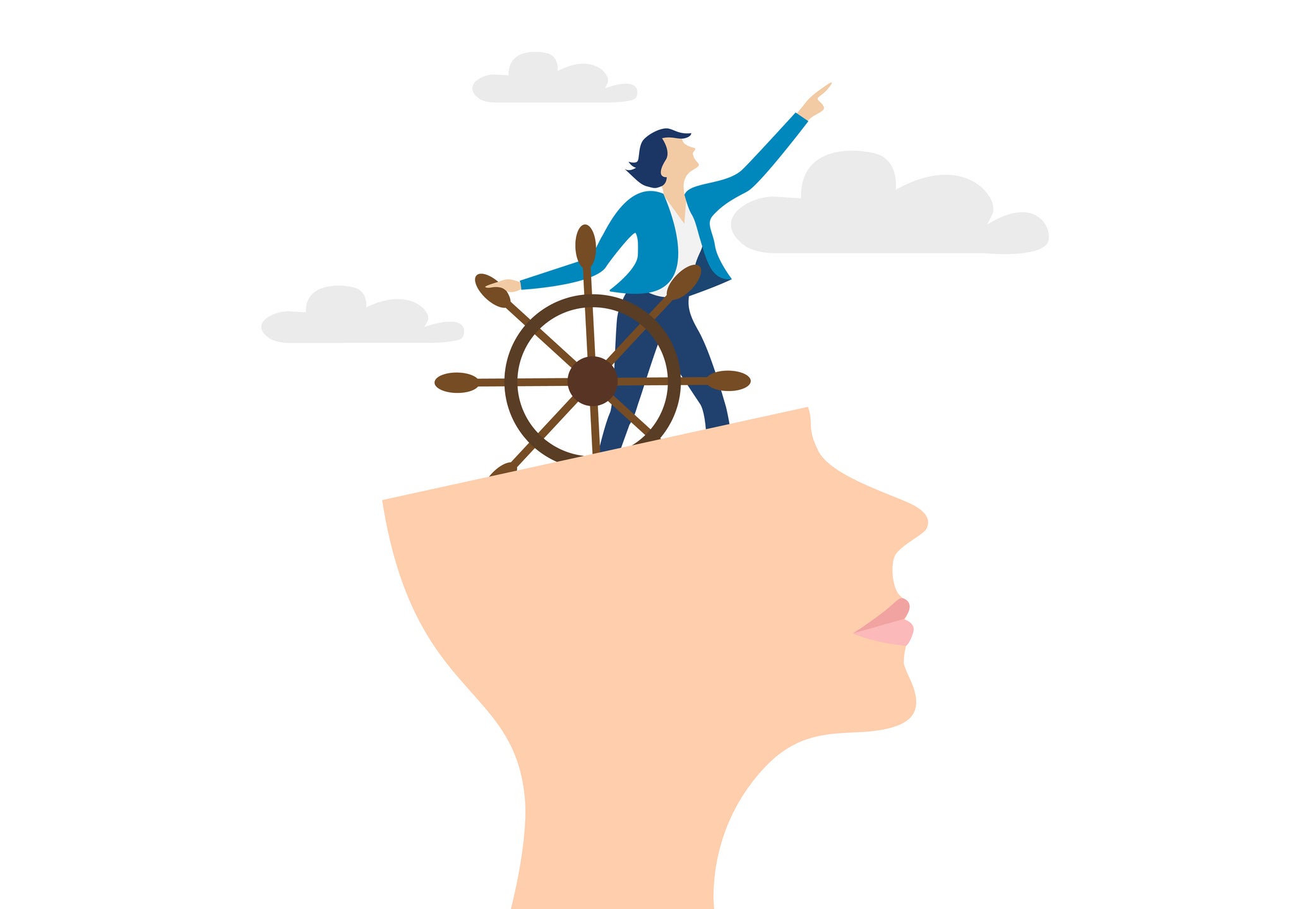
Rise at 5am. Peel off the tape you’ve placed over your mouth to optimise the way you breathe when you’re dreaming. Immerse yourself in ice-cold water – it’s teeth-grittingly unpleasant, but someone on the internet with a convincing manner told you it would supercharge your focus for the rest of the day. Once you’re out, it’s time to cue up a podcast, in which the earnest presenter bombards you with more advice on how to make tomorrow’s morning routine more punishing, and therefore more powerful. You’re freezing, you’re exhausted, but you’re also basking in the knowledge that you are more disciplined, more rigorous, than the rest of the world that hasn’t even pressed snooze yet.
When did self-discipline become the ultimate humblebrag? The impulse to knuckle down, engage our will power and hope that it makes us better people has permeated everything from our morning routines to our social media feeds to our weekend plans. Over-indulgence, it seems, is out; an Instagram-friendly form of asceticism is in (some people are calling it “monk mode”, thanks to its similarities with the pared-back, isolated lifestyle adopted by monastic types).
If you’ve ever spent a few seconds hovering over some kind of exercise or wellness-related posts on social media, you’re probably now being bombarded with motivational videos encouraging you to block out distractions, cut out anything fun and focus your energies on becoming a fully optimised version of you. “Disappear and come back unrecognisable” is a common refrain in these posts, as if wiping out any foible, weakness or idiosyncrasy that made you, well, you, is the ultimate goal.
It’s as if we’re all supposed to be engaged in some form of self-improvement, the more punishing the better. Like swimming? Fine, just make sure the water’s on the chilly side, to make the most of the metabolism boost. Like reading? Swap that novel for a tome about productivity or mastering your mornings or learning how to maximise your willpower. You won’t be the only one doing so: according to data from Nielsen, self-help and popular psychology was the top non-fiction genre of last year overall. Like running? Sign up for a marathon (or at least make sure you’re telling everyone about your sub-half-hour 5k time).
When you look at the way we’re working out now, the mood shift is especially stark. Rewind about a decade or so, and novelty classes seemed to rule the fitness world; the more outlandish, the better. Every new launch seemed to involve bopping around with glow sticks or bouncing around on a tiny trampoline or learning a routine to a retro pop song. Now, though, the emphasis is on methods that require consistency, precision and focus – think Pilates, pole-dancing or functional fitness challenges such as Hyrox – rather than chaotic abandon. The fact that they will supposedly give you the lean body type that, for better or worse, has come to symbolise discipline is obviously another plus for the self-improver.
And then there’s the rise of gruelling endurance tests such as 75 Hard, whereby participants willingly opt in to, well, 75 days of going hard: sticking to a diet plan, exercising twice a day for 45 minutes each session (one indoor, one outdoor, whatever the weather), reading 10 pages of a non-fiction book, ditching alcohol and drinking a gallon of water. Sounds exhausting, right? Willing converts also need to take a progress photo on every single one of those days, because part of the appeal is being able to track and share what they’re doing (and making everyone else feel a bit lazy in the process).

Anthropologist Dr Lollie Mancey has been observing how our current “fixation on self-discipline and self-optimisation reflects a deeper societal shift”, one whereby “self-improvement has become performative, commodified, and ultimately positioned as a kind of moral superiority”. The hallmarks of any self-optimiser’s day-to-day – think “cold plunges, intricate morning routines, biohacking, relentless productivity hacks” – she adds, are not “just wellness practices, they’re status symbols. They tell the world you are in control, you are high-functioning, and crucially, you are deserving”. The effort that we’re putting into becoming better (and the definition of “better” is, of course, highly subjective – and often synonymous with wealthier or more conventionally attractive) becomes a symbol of our worth.
The urge to “improve” ourselves through a combination of will power, persistence and self-mastery is nothing new. “I think you can find evidence of this from early recorded human history,” says psychotherapist and author Eloise Skinner. The Bible, she adds, “offered various forms of self-development and betterment strategies”, and Chinese general Sun Tzu’s treatise The Art of War, written in the 5th century BC, still gets cited as an inspiration by politicians and business moguls alike. The ancient Egyptians, meanwhile, looked to instructional texts known as “sebayt”, which advocated the virtue of self-control; these writings celebrated the ideal of the “silent man”, a judicious figure who takes his time to react in contrast to the “heated man”, who is petty and governed by his emotions.
People aren’t necessarily chasing self-discipline for the improvement it’ll make in their lives, they’re chasing it for the dopamine they’ll get from the approval of others
Skip forward through the centuries and you’ll find various tracts and conduct books, extolling the benefits of a dedicated work ethic and doling out advice on everything from managing your time to managing the home (no prizes for guessing which ones were aimed at men and which were geared towards women). In the 19th century, Thomas Edison became almost as famous for his long working hours and his steady perseverance as he did for his inventions (was he in fact the first grindset tech bro?).
By 1909, the author GK Chesterton had roundly skewered the entire genre in his essay “The Fallacy of Success”. “On every bookstall, in every magazine, you may find works telling people how to succeed,” he wrote. “They are books showing men how to succeed in everything; they are written by men who cannot even succeed in writing books.” Advertently or not, his diatribe managed to anticipate the self-help section of an airport WH Smith about a century in advance.
Now, though, there are plenty more ways for the self-discipline doctrine to spread. Social media is perhaps the biggest driver – both in terms of putting the message in front of us, and then giving us the chemical rush that comes with sharing our own endeavours to become better people. It’s “a grand stage” that allows us “to show the best version of ourselves”, says Bex Spiller, founder of The Anti-Burnout Club.

Now, she adds, “people aren’t necessarily chasing self-discipline for the improvement it’ll make in their lives, they’re chasing it for the dopamine they’ll get from the approval of others”. There’s a “real difference”, she notes, between “wanting to learn and grow as humans” and wanting to become our best selves simply for external validation.
The rise of wearable tech, giving us a constant stream of data relating to our bodies and how they might function more efficiently, adds another layer to this obsession, turning self-optimisation into a game (and making the results easily shareable, too). “Self-development has the advantage of being something that feels trackable, measurable and observable, unlike something more complex and multi-faceted, like the development of a relationship, for example, or contributing to one’s community,” Skinner says, and smart watches and fitness trackers provide us with “a visual way to symbolise achievement”.
And so while pursuing self-improvement was once synonymous with “spiritual or communal goals”, says Dr William Van Gordon, associate professor in contemplative psychology at the University of Derby, the focus has now “shifted to personal achievements that can be monitored, quantified and publicised”, whether that’s through wearables or braggy social media posts. It’s indicative, he adds, of a “more individualistic and technology-driven culture” – and reflects “an increasing propensity towards individualistic and self-advancing behaviour”. Essentially, Van Gordon says, being our “best self” has become “less about inner peace and more about standing out in a competitive, image-driven world”.
Mancey agrees. While older traditions relating to self-discipline and betterment “were often grounded in a relational understanding of the self, where individual flourishing was tied to responsibilities within the community”, she says, today’s practices are “often divorced from that context”. Instead, “they centre the individual and frequently ignore the broader social fabric that sustains us”.
Of course, there is absolutely nothing wrong with having goals, or following a routine, or, hell, even indulging in the odd episode of a motivational podcast. It’s important to feel like we’re working towards something that gives our life shape, structure and meaning; that might sometimes require setting your alarm early or giving up a few wild nights out. The risk, though, is that by ploughing all your energy into transforming into You 2.0, the perfect version of yourself, you might end up not only burning yourself out, but cutting yourself off from the people around you.
The self becomes the only realm where control seems possible
Is it really all that good for us to neglect our friendships in favour of ticking off 75 Hard’s twice-daily workouts? Given that the World Health Organisation has declared loneliness a “global public health concern” – and that researchers have found that a lack of social connection can increase the risk of premature death as much as smoking 15 cigarettes a day – I’m tempted to respond with a resounding “no”. Van Gordon, meanwhile, says that his work has found that “being overly self-orientated” can be “associated with mental health problems such as anxiety and depression”, and a reduction in our ability to engage prosocially (carrying out altruistic actions intended to benefit others).
You start to wonder whether there’s an element of self-protection at play here. Human connection can be inconsistent and volatile, and so “controlling and refining our own actions often feels a lot more manageable, or less ‘messy’, than engaging in unpredictable relationships or connections with others”, Skinner says. Solipsism can feel safe.
And part of this impulse for self-discipline might also be an entirely understandable response to a pervasive sense of uncertainty – that feeling of not being entirely sure what fresh hell is about to break loose at home or abroad. “When institutional trust is low, public services are hollowed out and social safety nets feel increasingly threadbare, people turn inward,” Mancey says. “The self becomes the only realm where control seems possible.” You might not be able to impact the wider world, you start to think, but you can claw back a sense of security by focusing on yourself.
But this logic, Mancey says, doesn’t just “promote hyper-individualism” and encourage us to “treat ourselves like startups: track everything, optimise endlessly, squeeze every ounce of value out of our time”. Taken to its extreme, she argues, it can “erode our connections with others. It reinforces a worldview where collective care is neglected, where success is solely personal, and where exhaustion becomes a badge of honour”. We might be “trying to control what feels uncontrollable”, but we’re arguably looking for answers in the wrong places.
“The solution isn’t more spreadsheets, more tracking apps or colder plunges,” Mancey adds. “It’s connection. It’s meaning. It’s remembering that flourishing is not a solo project.”







